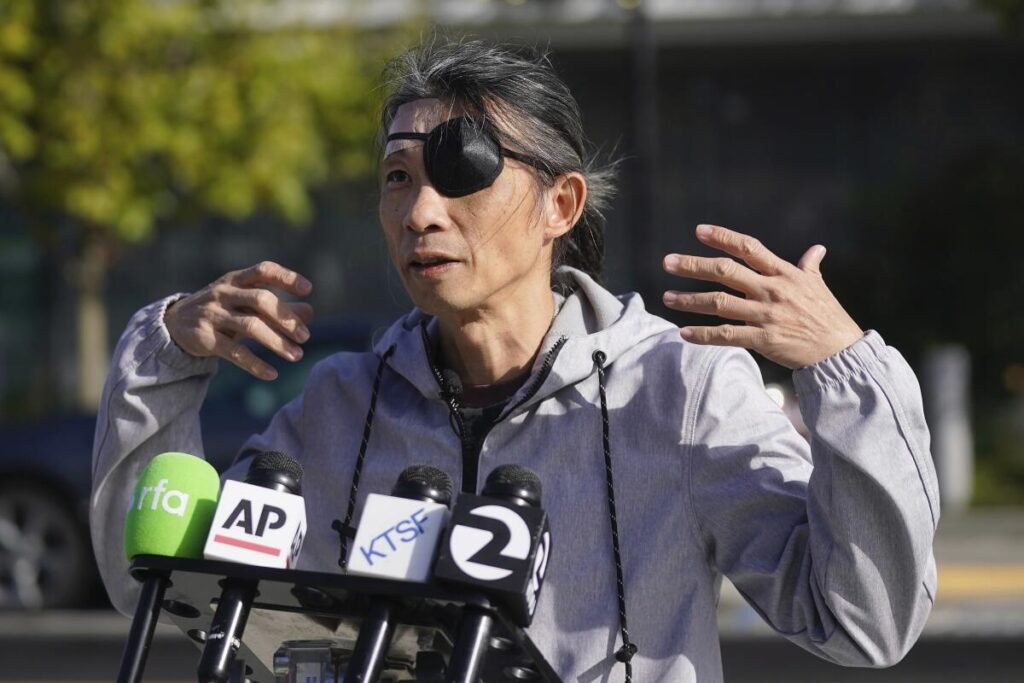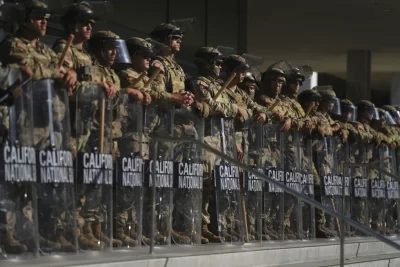
A man protesting against China’s ruling Communist Party at the recent Asia-Pacific economic summit in San Francisco shared details Wednesday of an attack by pro-China supporters, saying he was left unconscious and that police should take action against his assailants.
Kaiyu Zhang, who moved from Shanghai to Los Angeles in March, told reporters he and two other demonstrators were assaulted Nov. 17 by a group of young men wearing red headbands or arm bands after leaving a protest at the city’s international airport as leaders were departing the city.
His remarks came a day after bipartisan leaders of the Congressional-Executive Commission on China condemned efforts to silence critics of the Chinese Communist Party, known as the CCP. Republican Rep. Chris Smith of New Jersey and Democratic Sen. Jeff Merkley of Oregon cited videos from protests at the APEC summit showing human rights activists being harassed and assaulted by counterdemonstrators.
“We, the Chairs of the CECC, strongly condemn the reported violence perpetrated against individuals exercising their rights of freedom of expression and assembly in the United States. We urge San Francisco County police to review these reports and pursue justice as appropriate,” they said in a statement Tuesday.
Chinese President Xi Jinping met with President Joe Biden and other foreign leaders during the Asia-Pacific Economic Conference, which took over downtown San Francisco for a week, drawing foreign dignitaries, journalists and many protesters.
Zhang, 51, said he and a 74-year-old man were injured and that he lost consciousness. Both had to be hospitalized and he said he’s still recovering from injuries to his head and left eye.
“How could this happen in America? This thing’s supposed to only happen in China,” said Zhang.
Zhang was at the South San Francisco Police Department headquarters to give investigators what he believes is the name of one of his attackers. Police had previously said an assault and battery investigation is underway, but reported no arrests.
The Congressional-Executive Commission said the group Human Rights in China alleged that counterprotesters may have ties to the Chinese consulate in San Francisco. An email seeking comment from the consulate was not immediately answered Wednesday.
Opposition groups and dissidents have long alleged that the Chinese government is behind incidents of violence and online or physical harassment directed at critics living abroad. Chinese officials have denied any involvement, though when Xi travels local pro-Beijing groups rally at major events to showcase a strong welcome and drown out protesters.
In San Francisco during APEC, demonstrators showed up outside the Chinese consulate and the main APEC conference center with messages against Xi and the Chinese government. But high metal fences were installed to separate crowds from Xi’s motorcade, and Chinese and American flags were used to obscure them from view. Pro-Beijing groups surrounded protesters with large Chinese flags and used loudspeakers to drown out their chants.
Several skirmishes broke out and people were shoved to the ground with police officers intervening in some instances.
The San Francisco Police Department received several complaints of violence throughout the week of APEC and took action to make arrests when officers either witnessed attacks or were alerted to attacks in a timely manner, said Sergeant Kathryn Winters. She said the department continues to investigate complaints arising from the summit but did not specifically answer whether it was looking into allegations of harassment or assault against people protesting against the Chinese government.
U.S. law enforcement officials in recent years have repeatedly warned about what they say are aggressive, and criminal, efforts by Beijing to stalk, harass and intimidate political dissidents in the U.S. – a pattern of conduct known as transnational repression.
The Justice Department has brought multiple cases against operatives who they say have worked on behalf of a Chinese government, including by seeking to derail the congressional campaign of a little-known candidate in New York who decades earlier had been a student leader of the Tiananmen Square protests in Beijing. In one particularly notable case, a private investigator in New York was convicted last June after prosecutors said he’d been hired to try to bully an expatriate Chinese dissident living quietly in New Jersey into returning home.
Last year relations between Britain and China dipped to a new low after a Hong Kong protester said he was dragged into the Chinese Consulate in Manchester, England, and was beaten up by several of the consulate’s staff during a peaceful pro-democracy protest.
The incident drew widespread criticism from British lawmakers, and China later recalled six officials from the U.K., including the head of the Manchester Consulate, before British police had a chance to question them.
___
Associated Press writers Didi Tang and Eric Tucker in Washington, Sylvia Hui in London and Janie Har in San Francisco contributed to this report.




